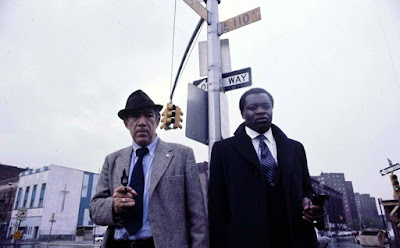Five On The Black Hand Side
directed by Oscar Williams
directed by Oscar Williams
From the mid sixties to the early seventies there was a cultural and artistic component to the US and associated diaspora civil rights/Black power movements. It didn't last long but for about a decade there was renewed interest--marketable interest--in Black centered stories and other art.
This film's director and writer thought that there were too many movies which presented Black actors and actresses as gangsters, pimps, drug dealers, super studs, and foxy mamas all looking to "stick it to the Man" over a wah-wah guitar and congas soundtrack. The writer and playwright Charlie Russell, the older brother of NBA superstar Bill Russell, conceived this movie as an anti-blaxploitation corrective.
This film has no nudity, toplessness, or real violence. It's a broadly humorous, though not slapstick look, at issues impacting a Black Los Angeles family.




















